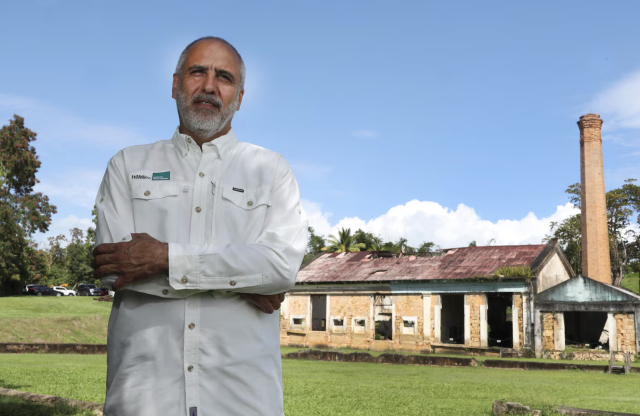Puerto Rican Conservation Leader to Represent the Caribbean on IUCN Council
Submitted on 24 September 2025 - 6:49pm
This article is reproduced by CienciaPR with permission from the original source.
CienciaPR Contribution:
Original Source:
By:

Puerto Rican conservationist Fernando Lloveras San Miguel, president of Para la Naturaleza, is set to become the next Caribbean representative on the Council of the International Union for Conservation of Nature (IUCN), the world’s largest environmental organization and its top governing body.
If his election is confirmed—as expected—during the upcoming World Conservation Congress in October, Lloveras San Miguel will become the first Puerto Rican to hold this position. He will be responsible for representing 23 countries and territories in the Caribbean, a region renowned for its biodiversity but also one of the most vulnerable to the impacts of climate change.
His nomination, endorsed by representatives from other Caribbean nations within IUCN, was made possible after a recent amendment to the organization’s statutes. Previously, its rules prohibited more than one council member from holding the same citizenship, a restriction that disproportionately affected territories under the jurisdiction of larger powers.
“I always focus on the Caribbean’s biological richness, which is unique. We are considered a ‘hotspot’ by IUCN—one of only 25 in the world—meaning areas of exceptional biodiversity under severe threat. That highlights the role we must play in protecting this biodiversity from those threats,” Lloveras San Miguel told El Nuevo Día.
According to its website, IUCN has 1,400 members, including environmental organizations, scientific and academic entities, commercial groups, and government agencies. Lloveras San Miguel has been connected to the organization for 12 years through his role at Para la Naturaleza.
Like its neighbors, Puerto Rico lies in the Atlantic hurricane corridor, facing annual threats that climate change has only worsened. Rising ocean temperatures and more intense storms pose risks to human life, infrastructure, and biodiversity.
“This also has consequences for marine life. Many species cannot withstand drastic ocean changes and either migrate or die. Coral reefs—our marine forests, home to countless aquatic species—are bleaching at alarming rates. Losing corals means losing marine life, food sources, and even coastal defenses,” said Lloveras San Miguel, who also serves as executive director of the Puerto Rico Conservation Trust.
He also highlighted other regional challenges tied to climate change, including the sargassum phenomenon, which increasingly combines with ocean plastic pollution to devastate coastal ecosystems. “We’ve seen waves of trash arrive at our coasts tied to sargassum blooms, which are worsened by climate change, suffocating coastal waters. One of my main goals is to place the Caribbean at the forefront of the global conservation agenda. When we look at the bigger picture, island nations contribute the least to global emissions but suffer the most from climate change. There’s a clear inequity in how islands worldwide are paying the price for the pollution of others,” he said.
Looking ahead, Lloveras San Miguel expects to be active in an IUCN commission focused on small island states, which often lack the resources to adapt and mitigate climate-related damage.
Greater Representation for Territories
In the upcoming IUCN World Conservation Congress (October 9–15), Lloveras San Miguel is running unopposed to represent the Caribbean and is expected to succeed Dominican herpetologist Sixto Incháustegui, who has served for the past four years.
His path was made possible thanks to reforms approved at the last Congress, granting greater representation and visibility to territories like Puerto Rico that lack independent citizenship due to their political ties to other nations.
“The statutes didn’t allow two members of the Council with the same citizenship, which excluded French and U.S. territories, including Puerto Rico. The rules were amended to recognize that while we share citizenship, we represent geographically distinct regions. This change now allows territories to represent their natural areas,” he explained.
The IUCN Council consists of 28 members across eight regions, including North America and the Caribbean. That region has three seats: one for the United States, one for Canada, and one for the Caribbean.
“In the Caribbean, there are 23 countries, and nearly half are dependencies of other nations. This meant that 11 territories were silenced, unable to participate in global governance within IUCN. Now, these 11 have the opportunity to aspire to represent the Caribbean,” said Lloveras San Miguel.







